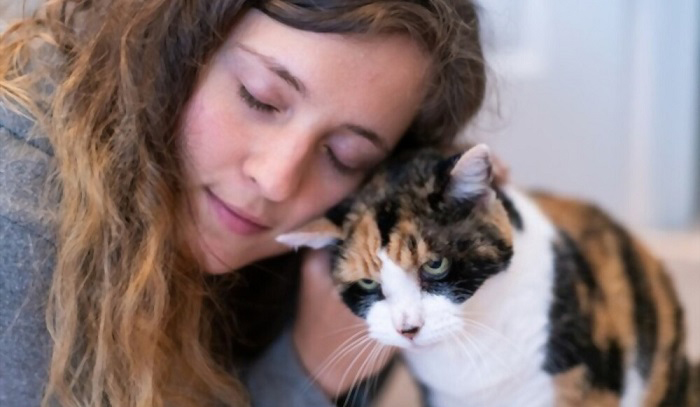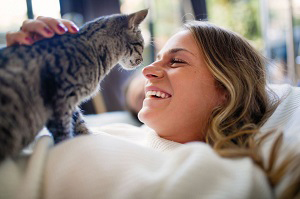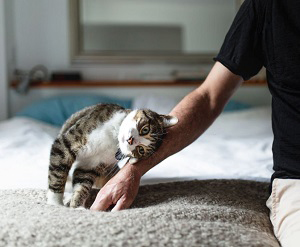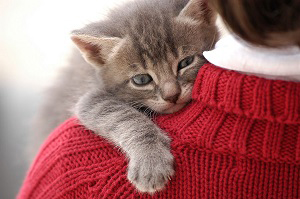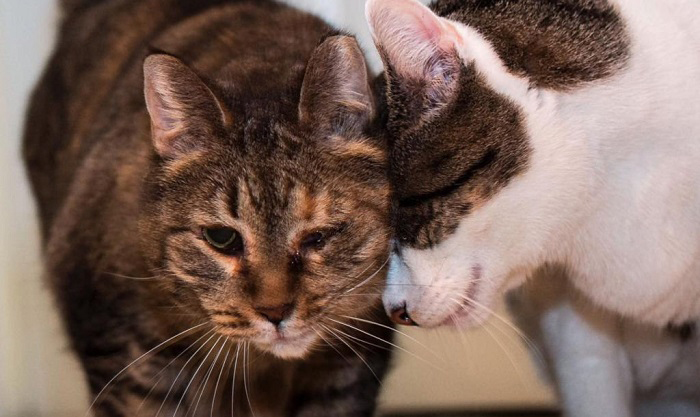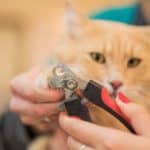Cats are thought to be aloof animals, but owners know they are quite affectionate. Most likely, you have noticed your pet “bunting” you. It is usually a soft headbutt against you, other animals, or even objects.
You may ask, “why does my cat headbutt me?” You don’t need to worry about this. From scenting you to creating a safe environment, here are the reasons why.
Table of Contents
3 Common Reasons for Headbutts
When felines tap their heads against you, it is usually accompanied by rubbing their body. Sometimes, it is a one-time tap, but other times, they repeatedly do it. What does it mean?
1. A sign of affection
You may wonder, “why does my cat headbutt my face? Is there something wrong?” The short answer is your pet likes you.
It feels comfortable enough to get close to you and expose a vulnerable part of its body to you.
Cats don’t trust easily as they are also prey to other animals. So, when they push their head against your face, hand, or other body parts, it is a sign they are in a relaxed state. Cat headbutt and purring sometimes occur simultaneously, which is a lovely bonus.
You may have also asked, “why does my cat headbutt me when I’m sleeping?” You may wonder about this given you already know how your pet feels about you. But they tend to do this to seek affection. They likely want you to pet them or let them snuggle with you.
Read more about cat behaviors when you sleep below:
2. A way to scent
Cats have numerous scent glands all over their body. Some are found on their heads, cheeks, front paws, and even the underside of their tails. This is why they rub their bodies against people, other cats and animals, and inanimate objects.
When they rub, they are transferring their scents. The glands have pheromones that communicate a variety of information only cats can understand.
Your pet does this as they want you or the object to start smelling like them. In a way, it is similar to marking their territory.
For owners, domesticated cats show how much they admire and love you. A cat headbutt shows the meaning they are welcoming you into their group. Think of it as letting you join their inner circle.
So, don’t worry when you notice your “cat keeps headbutting me.” Even more so in the morning, when you just woke up and felt groggy. Enjoy the experience as it demonstrates the friendliness of your pet.
3. Creating a safe space
Similar to why cats rub their bodies against you, they do it to their surroundings to mark them. The cat headbutt meaning here is them transferring their pheromones to a sense of familiarity.
This is especially useful to newly-adopted or newly-bought cats. You brought them to a strange environment, and so they tend to be anxious. They are wary of their surroundings and sensitive to any threat.
A part of their routine to feel safe is to headbutt objects. This includes furniture like chairs, tables, shelves, and sofas. Allow your cat to do this. It helps them adjust to you and their new home.
Frequently Asked Questions
Is there a difference between headbutting and head pressing?
While cats like to express affection by physical touch, you must be on the lookout for any negative behavior. This includes head pressing.
Unlike when a cat softly taps its head against you or an object, head pressing is when it pushes its head against a wall. When they do this, you will notice they are uncomfortable. They look downcast and stay in the position motionless.
When this happens, check your cat right away. Head pressing can be a symptom of a neurological condition called prosencephalon disease. Other signs include excessive pacing, issues with reflexes, and vision problems.
Your veterinarian will tell you the actual cause of head pressing. But these can range from head trauma to a tumor to a bacterial or viral infection. It is best to visit the pet clinic to address this concern immediately.
Why doesn’y my cat headbutt me?
Cats have different backgrounds and personalities. Some, especially the confident ones, tend to head bunt more than the shy ones.
The former may be the dominant cat in their group. So, they think it is their primary responsibility to transfer group scents.
For the latter kind, there is no need to be concerned with them. They may simply not want to but choose to show affection in other ways.
Remember not to be aggressive or scold your cat for not exhibiting the behavior you want. Be patient or try to coax them. If not, accept that your feline friend is simply created that way.
How do I respond to cat head butting me?
Like any other affectionate behavior, enjoy it. You can pet your cat, scritch their neck, or nuzzle close to them. Make them feel welcome and loved.
The next time you get curious about “why does my cat headbutt my hand,” start caressing them. You are sure to receive purrs and a good cuddling time in return.
Conclusion
“Why does my cat headbutt me?” is a question that some owners may be shy to ask. After all, it does seem quite obvious. But it is still good to know that beyond expressing affection, the action is done to scent you and create a safe environment.
In some other cases, it turns out to be “head pressing.” This is the time when you start worrying and take your feline friend to the veterinarian. The faster you address this concern, the more you can go back to snuggle times with your cat.

I am Amy Sawy, a Doctor of Veterinary Medicine (DVM) graduate from the University of Kansas. y husband, Dr. Plummer, and I own a veterinary clinic in Phillipsburg, Kansas. In addition to my professional background, I am a devoted pet owner myself, with a household that includes dogs, rodents, and most notably, cats – a total of five felines in my home.
In 2020, I joined an organization as a professional writer, leveraging my experience and collaborating with my team to deliver the most valuable information for your cat’s care.


